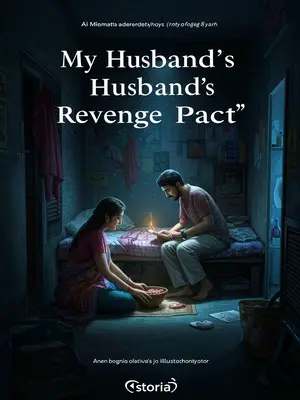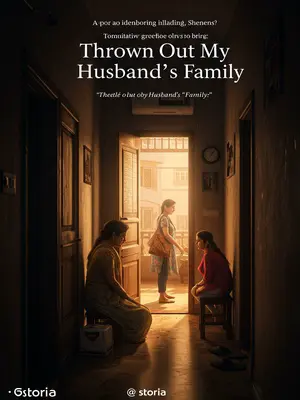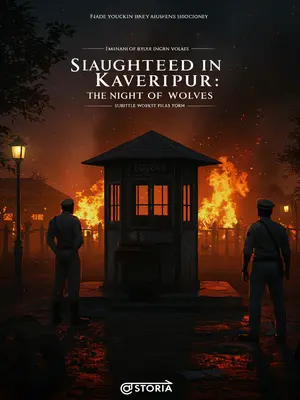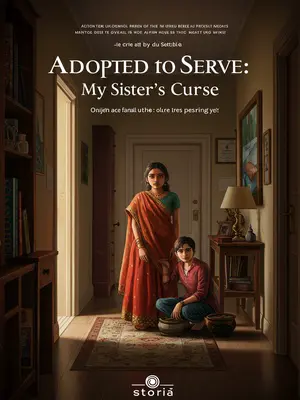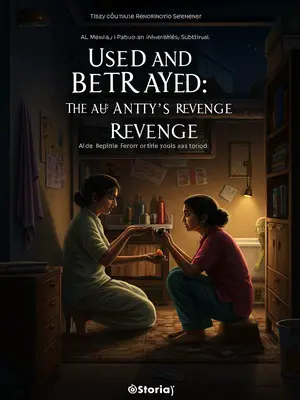Chapter 1: The Reclining Incident
The platform smelled of hot chai and engine oil, and the loudspeaker crackled with the names of distant towns. During the May Day holidays, I took the express train back home.
In India, May Day is that rare breather from endless office deadlines—a short escape when the city finally feels bearable, when even the chaiwallahs at the station have a smile for the rush of holiday travellers. The platform was bustling with families balancing steel tiffin boxes and kids clinging to mothers' dupattas. My train was already humming with that familiar chaos: samosas being unwrapped, newspaper-wrapped cutlets making the rounds, the distant echo of 'chai-chai, kaapi-kaapi!' I squeezed myself into my compartment, grateful to have bagged a confirmed seat this time.
Since the journey was long, I reclined my seat, hoping to lie back and catch a nap.
The whoosh of the AC and the rhythmic clacking of the train over tracks always made me drowsy. I thought, what better than a short nap to shake off my week’s fatigue? I pressed the lever and slowly tilted the seat, sighing in relief as my aching back found some comfort. Nearby, the train’s steel window frames rattled gently; outside, fields flashed by, green and yellow, under the May sun.
But as soon as I did, someone behind me shoved my seat hard.
The jolt was so sudden that I nearly dropped the little packet of moong dal I had started to open. For a second, I just sat there, the sound of the train filling the silence as I gathered myself. I twisted around in my seat, surprised and already feeling a flush of irritation rising up my neck.
I turned around and saw a man sitting behind me, glaring coldly.
He looked like one of those seasoned travellers who felt every inch of the train belonged to him—shirt buttoned up to his throat, gold ring glinting on his finger, thick glasses perched on a nose that seemed to sniff disapproval at the world. He fixed me with a stare that would have made a school kid gulp.
He barked, "Arrey, yeh kya? You think you’re alone here? Sit up, yaar—kuchh tameez hai ya nahi?"
There was a sharpness in his tone, that peculiar Indian way of shaming you in public—as if good manners were only his to define. A few heads turned, some curious, others barely bothering, used to small squabbles on long train rides.
My mouth went dry, and for a moment, I just stared at him, words stuck behind my teeth.
It felt like someone had slapped me in the middle of a bazaar. For a moment, I was at a loss for words, my hands hovering awkwardly over my lap. The train’s low hum seemed to fade as embarrassment crept over me.
I couldn’t understand what this had to do with manners.
I mean, isn’t this what the seat is meant for? Why would they provide a reclining lever if it’s a crime to use it? I looked around, hoping for a sympathetic face, but aunty two seats ahead didn’t even look up, still circling clues in her Deccan Herald crossword, and the uncle next to me was snoring gently.
I hesitated, glancing at my phone for courage, fingers fidgeting with my train ticket. Finally, I managed, "I just want to lean back and sleep for a bit."
I tried to keep my voice polite, the way my mother would have wanted. I even managed a small apologetic smile, as if seeking his approval for a perfectly reasonable request.
He cut me off, impatiently: "I won’t let you recline, got it?"
His voice was raised now, drawing more eyes. The rudeness stung. It was the kind of tone people reserve for autorickshaw drivers during a fare dispute, or for errant kids playing cricket in the gully.
This sudden confrontation left me at a loss.
My mind raced through possible responses, but the words just wouldn’t come. My ears burned, and I could feel the stares of half the compartment crawling over my skin. Why was I being treated like a schoolboy?
Logically, if the train seats can recline, then passengers should be allowed to recline them.
Everyone knows this, right? This is the standard Indian Railways design. My back wasn’t some weapon I was wielding—just a tired, battered thing begging for a break. For a second, I remembered the barracks—shouting matches settled over a cup of watery tea, never like this.
Because of work, my lower back is always in pain. If I have to sit upright for six hours on the train, how am I supposed to manage?
The dull ache was already spreading, and I tried to adjust the folded towel I’d brought along as a cushion. The seat covers smelled faintly of naphthalene and sweat. I knew if I stayed upright for the whole trip, I’d pay for it with two days of pain.
What made it worse was that I noticed the man’s own seat was reclined.
He was sprawled comfortably, his legs stretched out, the seatback almost touching the window grill behind him. The hypocrisy was so blatant I nearly laughed. For a second, I wondered if I was on a hidden camera show.
He reclined his seat, but wouldn’t let me recline mine.
I stared at the gap between his seat and the rear wall, incredulous. My mind flashed to that old Bollywood trope: "Rules are only for others, not for me." Some things never change.
I couldn’t help but point it out: "Didn’t you recline your seat too?"
My tone was even, but I could hear the frustration leaking through. I tried not to let the others see how annoyed I was—no point becoming the subject of their WhatsApp stories.
He shot back, still impatient: "Do you see anyone behind me?"
He spoke with that self-assured arrogance, like the local uncle who always parks his scooter in the no-parking zone just because he’s ‘known’ in the area.
Only then did I realise he was in the last row of the compartment—there really was no one behind him.
I mentally slapped my forehead. Of course, the seat behind him was empty—he had all the space in the world. Just my luck to get stuck in front of such a specimen.
I said, "But you’ve already reclined, right? Your space is already bigger."
My voice trembled a bit, not from fear, but from sheer disbelief at his stubbornness. Somewhere at the back of my mind, my father’s voice echoed, "Don’t argue with fools, beta."
He sneered, "Mind your own business. Anyway, I’m not letting you recline. Shut up and stop bothering me while I’m watching my movie."
He slid his phone into a holder clipped to the tray table, earphones plugged in, acting as if the rest of the world had ceased to exist. There was a smugness in his words that made my fists clench involuntarily. Even so, I tried to let it pass—these petty fights could drag on forever in India.
I was starting to get angry too. "Then why don’t you swap seats with me? Why can you lie down, but I can’t?"
My tone was sharper now, the edge unmistakable. Some nearby passengers looked up from their phones, sensing an escalation. I could almost hear them thinking: 'Arrey, now the real drama will start.'
He seemed annoyed, ignored me completely, and instead shoved my seat again, forcing me upright. Then he propped up his tablet on the tray table and started his movie.
The jolt sent a sharp pain shooting up my back. I bit down on my frustration, watching him settle in with the ease of a man who knew he’d won the argument. He didn’t even spare me a glance. It was as if I was invisible, like a fly buzzing near his ear.
The feeling was suffocating.
My throat felt tight, the way it does when you’ve been insulted in public and can’t shout back. I pressed my palm into my lower back, trying to ease the ache, but the pain was stubborn. The compartment suddenly felt stuffy, heavy with unspoken tension.
My back really hurt. I just wanted to lean back and rest.
I glanced out the window, searching for a distraction—anything to take my mind off the discomfort. The train rumbled past fields of mustard, distant temples, the odd cow ambling lazily along the tracks. But even nature’s calm couldn’t soothe the burning anger inside me.
Left with no choice, I found the train attendant, hoping they could help resolve the problem.
The attendant—a young woman in a navy blue sari, badge pinned crookedly to her blouse—was busy trying to explain to another passenger why there was no extra pillow. I waited for her to finish, then told her about the issue, keeping my tone as calm as possible. I hoped, perhaps naively, that she’d have some authority.
As soon as the attendant arrived, the man rolled his eyes and sneered, "Oh, went to tattle, is it? What are you, a school kid?"
He said it loud enough for half the compartment to hear, drawing snickers from a group of college boys nearby. I clenched my jaw, determined not to rise to the bait. In India, getting labelled a ‘complainer’ in public is sometimes worse than the original slight.
I swallowed my anger, not wanting to argue. The attendant tried to mediate, but the man cut her off impatiently: "I’m not letting him recline. If he does, I’ll have no space. Is that good enough for you?"
She adjusted her sari pallu, clearly uncomfortable, and avoided meeting my eyes. The attendant looked from me to him, her forehead creased in worry. She opened her mouth to speak, but he bulldozed right over her. She looked utterly helpless—like the ticket checker when people start fighting about seat reservations.
The attendant hesitated for a few seconds, then finally said to me, "Bhaiya, abhi adjust kar lo, please. I’ll try to find you another seat." Her words hung in the air, as disappointing as cold tea after a long wait. She shrugged, as if to say, "Arrey bhaiya, adjust kar lo na."
With that, she just turned and left.
I was dumbfounded.
I felt abandoned, left to the mercy of this unreasonable man. Was this how things worked? I had always believed that if you asked for help, at least someone in authority would try to mediate. Clearly, I had watched too many movies with heroic railway officers.
I had hoped for someone in charge to uphold justice, but instead, things ended so half-heartedly.
The words ‘log kya kahenge’ floated through my mind. Maybe it was foolish to expect justice in a country where everyone is too busy minding their own business, where confrontation is often met with a shrug and a look away.
Seeing the attendant leave so easily, the man mocked me: "You have no manners yourself, and you thought the staff would help you?"
His voice dripped with scorn. There was a glee in his words, the satisfaction of having won an argument on home ground. For a moment, I thought about giving him a piece of my mind in the choicest Hindi abuses, but years of army discipline held me back.
I felt so stifled.
My chest tightened, as if a heavy stone was pressing down. I gripped my phone, knuckles white, trying to keep my composure. It was one of those moments when you feel like shouting, but all you can do is swallow your anger and hope it doesn’t eat you up from inside.
I didn’t get it—buying a ticket means I have the right to use my seat. If the seat can recline, that’s my legitimate right. Why accuse me of having no manners?
I stared at the faded ticket stub in my hand, the one that bore my name and seat number, as if hoping it would suddenly grow teeth and defend me. In India, sometimes even your ticket feels powerless.
I searched my phone for what to do in this situation.
I scrolled through endless results on Google, checked the Indian Railways Twitter handle, even peeped into a couple of Quora threads where people debated the ethics of seat reclining with the passion of a cricket match.
But no matter how many articles I read, the official response was always the same: passengers should resolve it themselves; the crew can’t intervene.
Everyone seemed to agree: ‘Sir, yeh toh passengers ka matter hai. Aap hi adjust karo.’ The helplessness was almost comical, if it wasn’t so infuriating. I closed my phone and stared into space.
I took a deep breath, forced down my anger, and politely said to the man, "Bhaiya, my back really hurts. I can’t handle sitting upright for so long."
I added a little plea in my tone, the way we do when asking for a little extra chutney at the roadside dhaba—just enough humility to soften the other person’s heart. ‘Bhaiya’ is what you say when you want to appeal to a stranger’s better nature.
He replied indifferently, "Your back hurts, not mine. What’s that got to do with me?"
He didn’t even look at me, eyes glued to his screen. His words landed like a slap, hard and cold. That’s the thing with some people—they carry their own bubble of entitlement, and nothing you say can pop it.
I was out of options.
I looked down at my hands, scarred from old army days, and wondered how life had brought me from dodging bullets to begging for a little comfort on a train. It stung more than I cared to admit.
I’m not a weak person. It’s just that, after finally getting a holiday, my old army friends had made time to meet up. On such a rare break, finally able to see my comrades, I didn’t want to get into a fight with anyone.
There’s a code among us—soldiers don’t pick unnecessary fights. My friends had travelled from different corners of the state, all of us eager to relive old memories. I didn’t want this ugly episode to sour the reunion.
To make myself a bit more comfortable, I pulled up the curtain by the window, rested my elbow on the windowsill, and tried to give myself a little more space that way.
I could feel the heat of the afternoon sun pressing against the glass, and the thin blue curtain filtered the light just enough. I leaned my head against the window, closing my eyes, letting the gentle vibration of the train lull me. Maybe if I just ignored him, things would quiet down.




